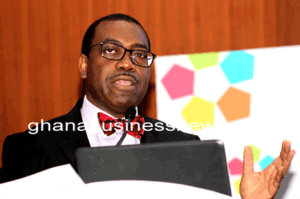We need to create a world that is equitable, stable to address the needs of others – Adesina

Dr. Akinwumi A. Adesina, President, African Development Bank Group (AfDB), says there is a need to create a world that is equitable, stable and a world where we bear in mind that the needs of others and not only what we need immediately.
He said the challenges of the world currently, from the COVID-19 pandemic, climate change, rising debt, food insecurity, and conflicts, were keeping the lid on development globally.
Dr Adesina was speaking at the 2023 Kofi Annan Eminent Speakers’ Lecture at an online event organised by the African Development Bank Group’s (AfDB) African Development Institute (ADI).
The session, titled “The Changing Global Development Finance Architecture: Implications for Multilateral Development Banks post COVID-19,” also featured Dr Jim Yong Kim, a former president of the World Bank.
He said the global development boat was leaking, and the consequences would be devastating, unless “we seal the leaking areas.”
He said at the top of the leakage was climate change which posed existential risks for the world and “we must do all we can to keep global warming to no more than 1.5 degree Celsius. We need innovations to power the world better with renewable energy.”
The President said there was too much hunger in the world, and it was not acceptable that over 2.3 billion people in the world go hungry.
“God did not create stomachs to go empty, He created them to be filled and there must be a hunger-free world,” he added.
He said the inability to cope with global health pandemics, coupled with the Covid-19 pandemic had taught the world how important it was to have global pandemic preparedness and ensure no one was left behind in access to affordable health care.
He said in Africa, development financing needs were huge and widening and AfDB estimated that Africa faced a financing gap of $1.2 trillion through 2030 to finance the SDGs and adapt to climate change.
The President said the financing requirements for Africa’s Nationally Determined Contributions under the Paris climate agreement were estimated at $277 billion annually until 2030.
Current flows of climate finance to Africa are far short of that, at just $30 billion in 2019/2020 and much of the available climate finance is concentrated in a few developed countries, and very little is available to support adaptation, which is Africa’s most urgent need.
He said there was no doubt that the global financial architecture was failing development in the world as it faced multiple global challenges.
He said the global financial architecture needed to be reformed and transformed to tackle more effectively global challenges, and to accelerate the achievement of the Sustainable Development Goals (SDGs).
“We must ensure equal opportunities for all. Regardless of one’s economic, social, or racial background, we must create a level playing field for a more just, fair, and equitable world,” he added.
Dr Adesina said Multilateral Development Banks (MDBs) played a unique role in tackling global development challenges.
By their nature, they are positioned to respond to global economic shocks, finance the needs of the SDGs, address rising fragility, and mobilize funding required to address climate change.
He said it was estimated that the new global challenges would require a tripling of financing from MDB, a doubling of bilateral aid, a significant increase in concessional lending and a massive rise in the flow of private capital.
He called on stakeholders to move from “billions of dollars’ to ’trillion of dollars”.
The G20 has called for significantly raising the ambition of the multilateral development banks, expanding resources for them to do more, improving their ability to take risk, optimising their balance sheets, deploying more financial innovations, and leveraging the private sector.
Critically, there is the need to work collectively as a system to effectively deploy knowledge, risk mitigation instruments and concessional financing at scale.
Source: GNA
